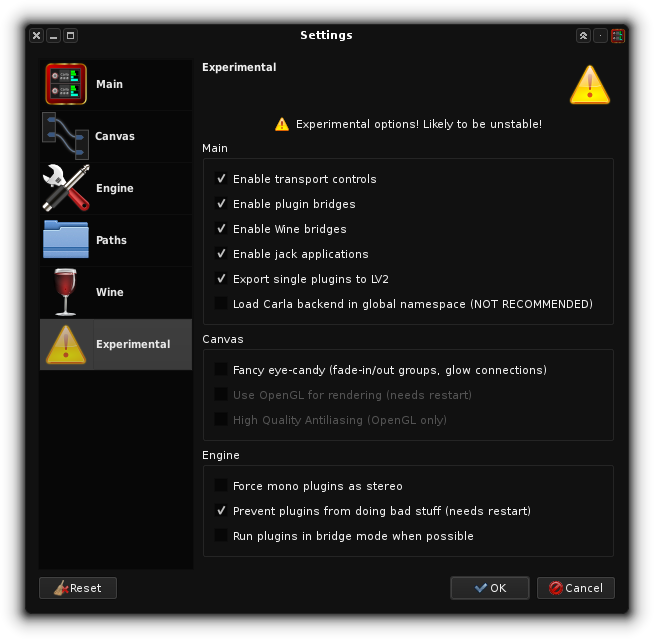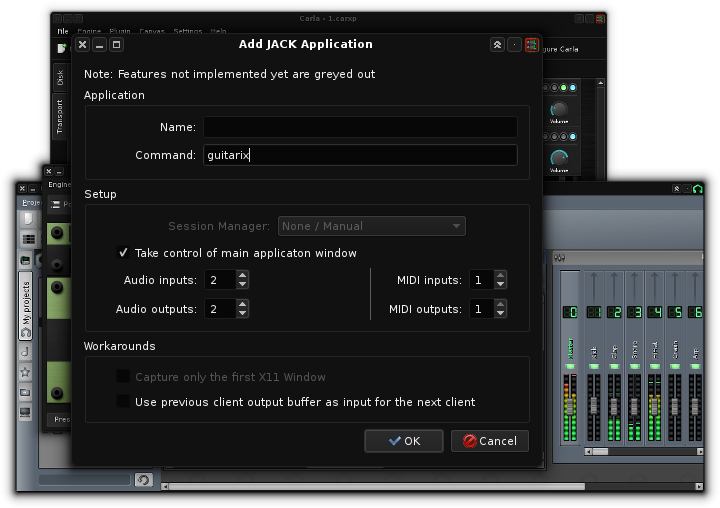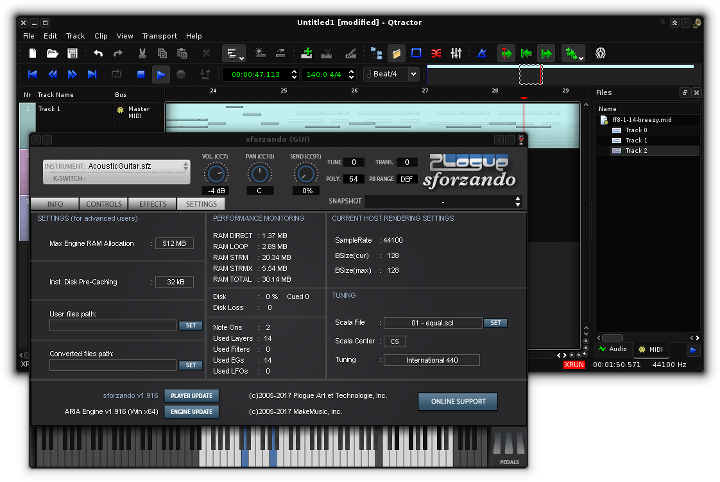KXStudio : News
>
DPF-Plugins and DISTRHO-Ports update
On 2018-05-13 by falkTX
A new release of DISTRHO-Ports after years without one!
A lot of changes happened on the underlying plugin frameworks (DPF and Juce).
I also updated the way updates are handled, so it will be less work for next time
(and thus, hopefully, have updates more often from now on)
The amount of changes in the plugin frameworks is so big (it has been 4 years since last release!),
that I am not going to write about them in detail.
But the major highlights follow below.
The following new Linux ports were added: (LV2 and VST)
- JuceOPL
- ReFine
The DPF-based plugins had some changes too:
- glBars added
- Kars added
- ndc-Plugs added
- A new DPF-Plugins git repo was created, for easy packaging of all our plugins
- MAX gen~ based plugins can be created, see
this link
Since last release, a few projects have appeared that use DPF. Here's a few:
-
FTZ Chiptune - Collection of basic waveform synths
-
Ninjas - Sample Slicing Plugin
-
Wolf-Shaper - Waveshaper with graph editor
-
ZamAudio plugin collection
- ZynAddSubFX,
uses DPF for its plugin support
Other small changes relevant to the project:
- Nekobi moved to plugins (used to be in ports), as original developer is happy with it
(and has RW access to our git repo too)
- The DPF "framework" has evolved with JACK Standalone export, Transport sync among other things
Checkout https://distrho.sourceforge.io/ for binary downloads and screenshots.
The complete source code is available at https://github.com/DISTRHO/.
PS: For those waiting for KXStudio 18.04 ISO release, work is underway, please be patient!
>
Cadence 0.9.0 release and KXStudio 18.04 preparations
On 2018-04-02 by falkTX
Cadence 0.9.0 has just been tagged in its
git repository.
No new features have been added to the code-base.
The release is focused on the Qt5 port, and of course the fixes that have been added over time.
Qt4 is no longer supported; the code was updated to work with Qt5, without having a fallback Qt4 mode (unlike Carla).
Cadence Qt5 port is needed for a proper KXStudio 18.04 release, as we will be using KDE5 Plasma as desktop environment.
The
KXStudio "Welcome" wizard
has also been ported to Qt5.
This finalizes the Qt4 => Qt5 porting process, with all KXStudio tools now running in Qt5.
In other news, the preparations for KXStudio's 18.04 ISO release
have started.
The decision is to use
Neon
as the base distro for the next ISO images, with Breezy-Dark as default theme.
The KXStudio configuration files have been ported from KDE4 to KDE5, with only a few tweaks missing now.
If you're running the KXStudio repositories with Neon 16.04, you can already install the kxstudio-desktop-neon package. :)
Note that Ubuntu 18.04 (and thus Neon 18.04) is not out yet, so a release will of course have to wait for them first.
(Neon does not actually have their 18.04 repositories fully ready at this point)
We will have beta images first, to let users test and give feedback.
When everything seems to run fine, and I am happy with the results, the final image will released.
No estimation on the 'when' just yet though - it will be out when it's ready - so please don't keep asking. ;)
>
Carla 2.0 beta6 is here!
On 2018-01-25 by falkTX
Hello again everyone, I am glad to bring you the 6th beta of the upcoming Carla 2.0 release.
It has been over one year since the last Carla release, it was about time. :)
This should be the last beta for the 2.0 series, as next one is planned to be release candidate 1.
There were quite some changes under the hood, mostly in a good way.
The trade-off for users is that this means losing some features, the biggest ones being VST3 and AU plugin support.
The way audio and MIDI devices are handled on Windows and macOS also changed, no longer having dynamic MIDI ports.
See the previous post about Carla to get more details on the "breaking changes".
But let's move on with the good stuff!
Here are some of the highlights for this release:
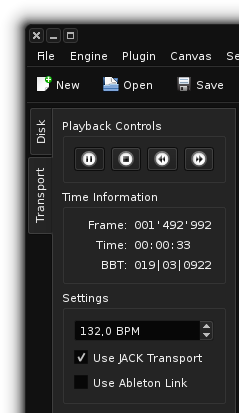
|
Transport controls and Ableton Link support (experimental)
Previous releases of Carla had basic time controls already,
but it was quite basic and lacked options for JACK transport and BPM control.
Transport can misbehave when rolling back or forwards, so this feature is still classified as experimental. |
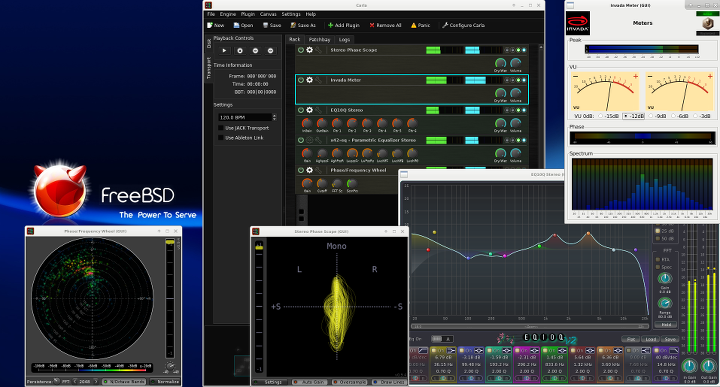
|
FreeBSD and other non-Linux systems
After the removal of the juce library from the code-base (as
discussed before),
Carla was free to support more than just the big 3 OSes. |
Other changes
There are quite a lot of other smaller changes made in Carla since beta5, these include:
- Added artwork and license to about dialog
- Added carla-rack no-midi-out mode as plugin
- Allow drag&drop of plugin binaries into Rack view
- Add "prevent bad plugin behaviour" option (experimental, Linux only)
- Auto-detect wine-prefix for plugin bridges
- Expand usable MIDI keyboard keys a little (Z-M plus Q-P for 2 full octaves and 5 extra keys)
- Implement parameter text for plugin bridges
- Implement "Manage UIs" option for macOS and Windows
- Place more parameters per tab in editor dialog
- Show active peaks and enable keyboard for carla-rack group in canvas
- Knobs are now controlled in a linear way
- Previous experimental plugins removed, and carla-zynaddsubfx no longer exported
- Rack view can handle integeter knobs properly
- Save and restore canvas positions (standalone only for now)
Special Notes
- Carla as plugin and Carla-Control are still not available for Windows, likely won't be done for v2.0.
Downloads
To download Carla binaries or source code, jump on over to the KXStudio downloads section.
If you're using the KXStudio repositories, you can simply install "carla-git" (plus "carla-lv2" and "carla-vst" if you're so inclined).
Bug reports and feature requests are welcome! Jump on over to the Carla's Github project page for those.
>
JACK2 1.9.12 release and future plans
On 2017-12-21 by falkTX
A few days ago a new version of JACK2 was released.
You can grab the latest release source code at
https://github.com/jackaudio/jack2/releases.
The official changelog is:
- Fix Windows build issues
- Fix build with gcc 7
- Show hint when DBus device reservation fails
- Add support for internal session files
If you did not know already, I am now maintaining JACK2 (and also JACK1).
So this latest release was brought to you by yours truly. ;)
The release was actually already tagged on the git repo quite some time ago, but I was waiting to see if Windows builds were possible.
I got side-tracked with other things and 1.9.12 ended up not being released for some time, until someone reminded me of it again... :)
There are still no updated macOS or Windows builds, but I did not want to delay the release further because of it.
The 1.9.11 release (without RC label) was skipped to avoid confusion with the versions.
So 1.9.12 is the latest release as of today. macOS and Windows binaries still use an older 1.9.11 version.
Being the maintainer of both JACK1 and JACK2 means I can (more or less) decide the future of JACK.
I believe a lot of people are interested to know the current plan.
First, JACK1 is in bug-fix mode only.
I want to keep it as the go-to reference implementation of JACK, but not add any new features to it.
The reason for this is to try to get JACK1 and JACK2 to share as much code as possible.
Currently JACK2 includes its own copy of JACK headers, examples and utilities, while JACK1 uses sub-repositories.
During the course of next year (that is, 2018) I want to get JACK2 to slowly use the same stuff JACK1 does, then switch to use the same repositories as submodules like JACK1 does.
This will reduce the differences between the 2 implementations, and make it a lot easier to contribute to the examples and utilities provided by JACK.
(Not to mention the confusion caused by having utilities that work in simlar yet different ways)
We will keep JACK1 "frozen" until this is all done.
Second, but not least important, is to get the JACK1 specific features into JACK2.
A few things were added into JACK1 after JACk2 was created, that never made it into JACK2.
This includes meta-data (JACK2 does have the API, but a non-functional one) and the new internal clients.
The purpose is to reduce reasons users might have to switch/decide between JACK1 and JACK2.
JACK2 should have all features that JACK1 has, so that most users choose JACK2.
Now, you are probably getting the impression that the focus will be on JACK2, which is correct.
Though I realize some developers might prefer JACK1's design, the long "battle" of JACK1 and JACK2 needs to stop.
Development of new features will happen in the JACK2 codebase, and JACK1 will slowly become legacy.
Well, this is my personal plan at least.
Not sure if this all can be done in 2018, but better to take things slowly and get things done than do nothing at all.
I will keep you updated on the progress through-out the year.
Happy holidays everyone!
>
Breaking changes in Carla Plugin Host
On 2017-11-21 by falkTX
Hello everyone, I have some bad and good news about Carla.
If you've been following the development on the git repository you likely know what this is about.
There were some major changes done to Carla's code base in the past few days.
The biggest change is the removal of the Juce library.
The reasons for this are well known by some developers, but I'll not write about them here.
After looking around for alternatives,
I decided to fork an older GPLv2 compatible version of Juce and strip it down to the really essential parts needed
to get Carla to build and run - even if it meant losing some of the features.
The possibility to change to an entirely different C++ framework crossed my mind,
but the amount of effort and breaking changes would be too big.
I called the end result 'water'. You can say Carla doesn't need Juce, water is fine ;)
There's only a few classes and files needed for I/O, XML and AudioGraph handling, everything else is gone. \o/
The implications for this change are not big for Linux users,
and is even a source of good news for other OpenSource Operating System users like FreeBSD and HaikuOS.
In short, because Juce is no longer there, we have lost support for VST3 and AudioUnit plugins.
Plus VST2 plugins on Windows and MacOS are now handled by Carla's code instead of relying on Juce.
This heavily reduces the amount of compatible plugins handled by Carla, because Juce had a lot of hacks in order
to make a lot of commercial plugins run properly.
Also Carla on Windows and MacOS used Juce to handle Audio and MIDI devices,
which now has been changed to RtAudio and RtMidi.
RtAudio & RtMidi are not as fully-featured as Juce was (we lose dynamic MIDI ports, for example),
but I am glad to have Juce gone from the code-base.
(You can say that parts of it are still there, but my conscience is clear,
and Carla remains self-contained which was my main point since v2.0 development started)
The next breaking change relates to the internal plugins used in Carla.
The plugins that already exist as LV2 will stop being exported with the carla.lv2 bundle.
Plus these plugins will soon be removed from the default build.
They quickly bloat the Carla binaries, as they include their artwork.
Not to mention increasing the clone and building times.
The plan is to have them disabled by default and moved into a new repository as submodule.
Oh and the "experimental" plugins are going away soon.
It was a mistake to make them Carla-specific in the first place, they should be regular audio plugins instead.
Another breaking change is the removal of modgui support.
The code only worked for PyQt4, which is no longer the default for Carla source-based builds.
Plus it required webkit, which brings a big list of dependencies.
I would have to port the code to webengine/chromium to make it work with PyQt5... no thanks.
The final breaking change is the introduction of the Experimental option in Carla's settings.
Everything that is not stable at the moment went there as an option, and got disabled by default. This includes:
- Plugin bridges
- Wine options
- Force-stereo mode
- Canvas eye-candy
- Canvas with OpenGL
All new in-development / testing features will get introduced as experimental first.
This will speed up the release of 2.0, since not everything needs to be finished for it.
For example, plugin bridges can still be there and not fully implemented, and we still have 2.0-stable out!
That's it! Thanks for reading so far.
In other news, I gave a small presentation about Carla in this year's Sonoj Conference.
You can check it out here:
https://media.ccc.de/v/sonoj2017-1704-carla-plugin-host
Carla 2.0-beta6 will be out soon :)
← PreviousNext →
 Applications
Applications Plugins
Plugins
